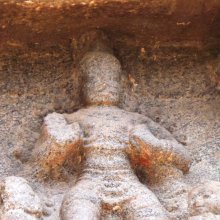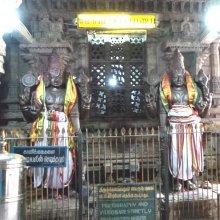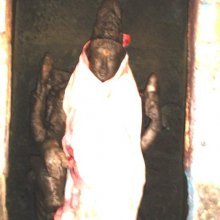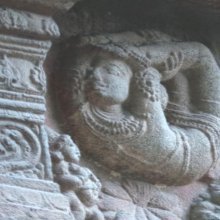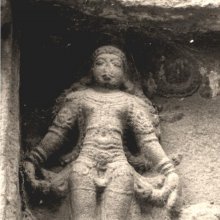Natya, Nāṭya, Naṭyā: 21 definitions
Introduction:
Natya means something in Buddhism, Pali, Hinduism, Sanskrit, the history of ancient India, Marathi, Hindi. If you want to know the exact meaning, history, etymology or English translation of this term then check out the descriptions on this page. Add your comment or reference to a book if you want to contribute to this summary article.
Natya has 20 English definitions available.
Images (photo gallery)
(+33 more images available)
Languages of India and abroad
Sanskrit dictionary
[Deutsch Wörterbuch]
Source: Cologne Digital Sanskrit Dictionaries: Böhtlingk and Roth Grosses Petersburger WörterbuchNaṭyā (नट्या):—(von naṭa) f. eine Gesellschaft von Schauspielern gaṇa pāśādi zu [Pāṇini’s acht Bücher 4, 2, 49.] Fehlt in einer Hdschr.; [Amarakoṣa] kennt nicht naṭyā, wohl aber naḍyā .
--- OR ---
Nāṭya (नाट्य):—(von naṭa)
1) n. [Pāṇini’s acht Bücher 4, 3, 129.] = lāsya und tauryatrika [Amarakoṣa 1, 1, 7, 10.] [Hemacandra’s Abhidhānacintāmaṇi 279. 280.] [Anekārthasaṃgraha 2, 369.] [Medinīkoṣa y. 33.] Tanz, Mimik, Darstellung auf der Bühne, Schauspielerkunst [Bhāgavatapurāṇa 4, 15, 19.] priya ein Freund des Tanzes, Beiname Śiva’s [Hemacandra’s Abhidhānacintāmaṇi 198.] nāṭyenāsīnā so v. a. das Niedersitzen auf dem Theater mimisch darstellend [Mṛcchakaṭikā 88, 4.] nāṭyenāvatīrṇau [Śākuntala 100, 1. 40, 16. 48, 20. 49, 21. 50, 22. 77, 10.] sunāṭyena naṭastadā . maharṣīṃstoṣayā māsa [Harivaṃśa 8575.] nāṭyālaṃkṛti [Sāhityadarpana 471.] kāvyanāṭyayoḥ [Hemacandra’s Abhidhānacintāmaṇi 326.] gīyatāṃ nāṭyocitaṃ kiṃcit [Dhūrtasamāgama 68, 17.] nāṭyokti f. ein Ausdruck vom Theater [170, 8.] [Amarakoṣa 1, 1, 7, 11.] nāṭyācārya m. Tanzlehrer u.s.w. [Mṛcchakaṭikā 49, 2.] nāṭyācāryaka n. nom. abstr. dazu [Pañcatantra III, 268.] nāṭyaśāstra n. die Lehre vom Tanze, von der Schauspielerkunst [Mālavikāgnimitra 13, 22.] [Trikāṇḍaśeṣa 3, 3, 174.] dharmikā f. Regeln über Mimik u.s.w. [Hemacandra’s Abhidhānacintāmaṇi 279.] dharmī f. dass. Schol. śālā Tanzsaal [GARUḌA-Pāṇini’s acht Bücher im Śabdakalpadruma] naṭo nāṭyadharaḥ ein Schauspieler in seinem Theatercostum [Bhāgavatapurāṇa 1, 8, 19.] —
2) m. Schauspieler: naṭanāṭyagāyakāḥ [Bhāgavatapurāṇa 7, 8, 50.]
--- OR ---
Nāṭya (नाट्य):—
1) nāṭyaṃ nṛtyaṃ tathā nṛttaṃ tredhā taditi kīrtitam (tad d. i. nartanam) [Oxforder Handschriften 200,a,4. fg.] unter den 64 Kalā [217,a,1.] veda [200,a,4.] [DAŚAR.1,4.] Kohala als nāṭyaśāstrapravaktar [Medinīkoṣa l. 84.] nāṭyavedīmiva śriyam [Kathāsaritsāgara 110, 133.] —
2) der [Scholiast] : naṭā nartakāḥ nāṭye nṛtye gāyakāśca .
--- OR ---
Nāṭya (नाट्य):—[Z. 13. fg.] das Costum eines Schauspielers auch [Bhāgavatapurāṇa 10, 41, 1.]
Source: Cologne Digital Sanskrit Dictionaries: Sanskrit-Wörterbuch in kürzerer FassungNaṭyā (नट्या):—f. Schauspielerbande.
--- OR ---
Nāṭya (नाट्य):—n. —
1) Tanz , Mimik , Darstellung auf der Bühne , Schauspielerkunst. nāṭyena so v.a. mimisch (Etwas darstellen). —
2) das Costüm eines Schauspielers.
Sanskrit, also spelled संस्कृतम् (saṃskṛtam), is an ancient language of India commonly seen as the grandmother of the Indo-European language family (even English!). Closely allied with Prakrit and Pali, Sanskrit is more exhaustive in both grammar and terms and has the most extensive collection of literature in the world, greatly surpassing its sister-languages Greek and Latin.
See also (Relevant definitions)
Starts with (+50): Natya arambh, Natya-krama, Natyacarya, Natyacaryaka, Natyacharya, Natyachata, Natyadarpana, Natyadhara, Natyadharma, Natyadharmi, Natyadharmika, Natyadharmmika, Natyadrita, Natyagama, Natyagara, Natyagati, Natyagriha, Natyaka, Natyakara, Natyakirna.
Ends with: Adakshinatya, Anatya, Aunnatya, Bharatanatya, Dakshinatya, Ghanatya, Kutanatya, Lokanatya, Mahanatya, Mukanatya, Nica-natya, Rudranatya, Samnatya, Sunatya, Vainatya, Vishnudatta dakshinatya.
Full-text (+538): Natyapriya, Natyashala, Natyaveda, Natyacarya, Nritya, Natyashastra, Natyavedi, Natyadharmika, Trimudhaka, Natara, Uttamottamaka, Anatya, Varicci, Pushpagandika, Natera, Natyalocanakara, Abhinaya, Natyadarpana, Natyapradipa, Natyalocana.
Relevant text
Search found 37 books and stories containing Natya, Nāṭya, Naṭyā; (plurals include: Natyas, Nāṭyas, Naṭyās). You can also click to the full overview containing English textual excerpts. Below are direct links for the most relevant articles:
Mudrarakshasa (literary study) (by Antara Chakravarty)
4. The entity of Vṛtti and its use in Mudrārākṣasa < [Chapter 5 - Adoption of Style and Language in Mudrārākṣasa]
6. Subhāśitas occuring in Mudrārākṣasa < [Chapter 5 - Adoption of Style and Language in Mudrārākṣasa]
Gati in Theory and Practice (by Dr. Sujatha Mohan)
Analysis of technical terms: Nāṭya, Nṛtta, Nṛtya < [Chapter 1 - Nāṭya]
Manifestation of Gati in Cārīs and Karaṇas (Introduction) < [Chapter 2 - Concept and technique of Gati]
Rasa-nishpatti—The goal of Natya < [Chapter 1 - Nāṭya]
Dasarupaka (critical study) (by Anuru Ranjan Mishra)
The concise nature of the Daśarūpaka < [Introduction]
Difference between the Daśarūpaka and the Nāṭyaśāstra < [Introduction]
The description of rūpa, rūpaka, nāṭya, nṛtya and nṛtta < [Introduction]
Amarakoshodghatana of Kshirasvamin (study) (by A. Yamuna Devi)
Three types of Dance < [Chapter 4 - Cultural Aspects]
Music (Nāṭya-varga) < [Chapter 4 - Cultural Aspects]
Amarakośa of Amarasiṃha < [Chapter 1 - Kośa Literature–A Brief Survey]
Abhinaya-darpana (English) (by Ananda Coomaraswamy)
Painting and Natya < [May-June 1935]
When Stones Dance < [January – March 1992]
Natya, the Celestial Art of Ancient India < [July 1939]
